一般将来时试题和答案
英语一般将来时试题(有答案和解析)含解析
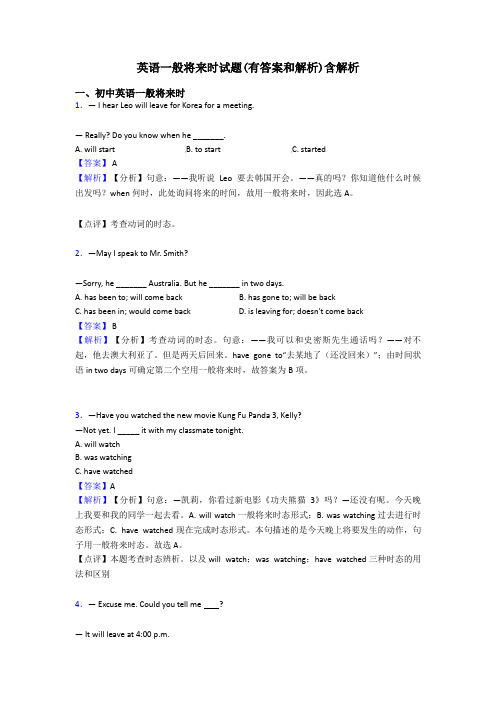
英语一般将来时试题(有答案和解析)含解析一、初中英语一般将来时1.— I hear Leo will leave for Korea for a meeting.— Really? Do you know when he _______.A. will startB. to startC. started【答案】 A【解析】【分析】句意:——我听说Leo要去韩国开会。
——真的吗?你知道他什么时候出发吗?when何时,此处询问将来的时间,故用一般将来时,因此选A。
【点评】考查动词的时态。
2.—May I speak to Mr. Smith?—Sorry, he _______ Australia. But he _______ in two days.A. has been to; will come backB. has gone to; will be backC. has been in; would come backD. is leaving for; doesn't come back【答案】 B【解析】【分析】考查动词的时态。
句意:——我可以和史密斯先生通话吗?——对不起,他去澳大利亚了。
但是两天后回来。
have gone to“去某地了(还没回来)”;由时间状语in two days可确定第二个空用一般将来时,故答案为B项。
3.—Have you watched the new movie Kung Fu Panda 3, Kelly?—Not yet. I _____ it with my classmate tonight.A. will watchB. was watchingC. have watched【答案】A【解析】【分析】句意:—凯莉,你看过新电影《功夫熊猫3》吗?—还没有呢。
今天晚上我要和我的同学一起去看。
A. will watch一般将来时态形式;B. was watching过去进行时态形式;C. have watched现在完成时态形式。
高考英语一般将来时题20套(带答案)及解析
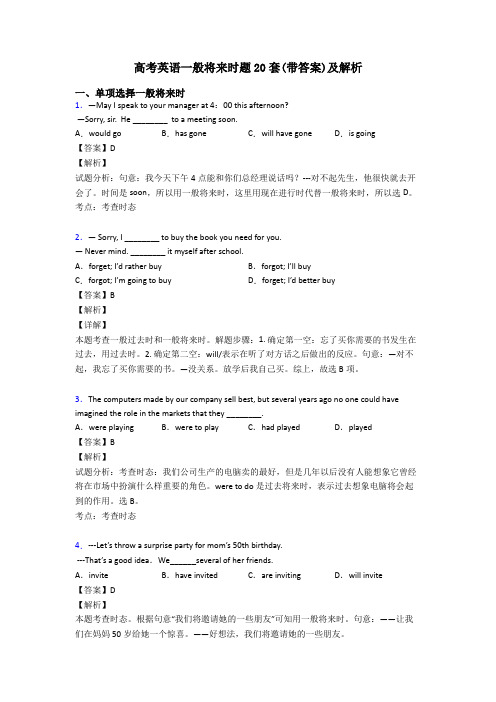
高考英语一般将来时题20套(带答案)及解析一、单项选择一般将来时1.—May I speak to your manager at 4:00 this afternoon?—Sorry, sir. He ________ to a meeting soon.A.would go B.has gone C.will have gone D.is going【答案】D【解析】试题分析:句意:我今天下午4点能和你们总经理说话吗?---对不起先生,他很快就去开会了。
时间是soon,所以用一般将来时,这里用现在进行时代替一般将来时,所以选D。
考点:考查时态2.— Sorry, I ________ to buy the book you need for you.— Never mind. ________ it myself after school.A.forget; I’d rather buy B.forgot; I’ll buyC.forgot; I’m going to buy D.forget; I’d better buy【答案】B【解析】【详解】本题考查一般过去时和一般将来时。
解题步骤:1. 确定第一空:忘了买你需要的书发生在过去,用过去时。
2. 确定第二空:will/表示在听了对方话之后做出的反应。
句意:—对不起,我忘了买你需要的书。
—没关系。
放学后我自己买。
综上,故选B项。
3.The computers made by our company sell best, but several years ago no one could have imagined the role in the markets that they ________.A.were playing B.were to play C.had played D.played【答案】B【解析】试题分析:考查时态:我们公司生产的电脑卖的最好,但是几年以后没有人能想象它曾经将在市场中扮演什么样重要的角色。
【英语】 中考英语一般将来时20篇(附带答案解析)
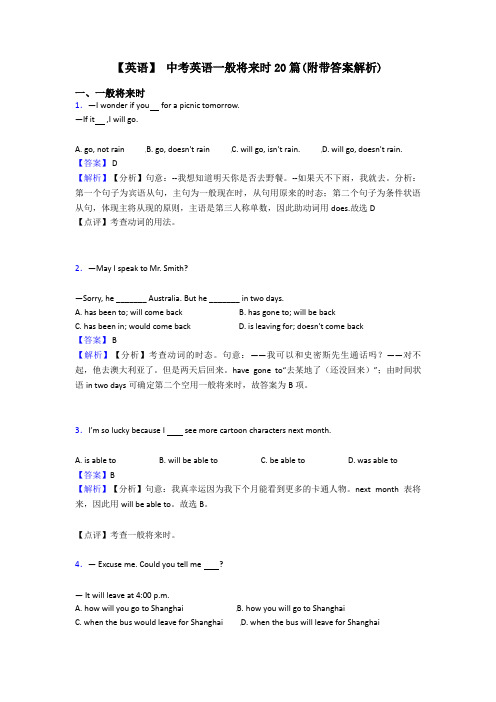
【英语】中考英语一般将来时20篇(附带答案解析)一、一般将来时1.—I wonder if you for a picnic tomorrow.—If it ,I will go.A. go, not rainB. go, doesn't rainC. will go, isn't rain.D. will go, doesn't rain.【答案】 D【解析】【分析】句意:--我想知道明天你是否去野餐。
--如果天不下雨,我就去。
分析:第一个句子为宾语从句,主句为一般现在时,从句用原来的时态;第二个句子为条件状语从句,体现主将从现的原则,主语是第三人称单数,因此助动词用does.故选D【点评】考查动词的用法。
2.—May I speak to Mr. Smith?—Sorry, he _______ Australia. But he _______ in two days.A. has been to; will come backB. has gone to; will be backC. has been in; would come backD. is leaving for; doesn't come back【答案】 B【解析】【分析】考查动词的时态。
句意:——我可以和史密斯先生通话吗?——对不起,他去澳大利亚了。
但是两天后回来。
have gone to“去某地了(还没回来)”;由时间状语in two days可确定第二个空用一般将来时,故答案为B项。
3.I’m so lucky because I see more cartoon characters next month.A. is able toB. will be able toC. be able toD. was able to【答案】B【解析】【分析】句意:我真幸运因为我下个月能看到更多的卡通人物。
最新一般将来时试题和答案
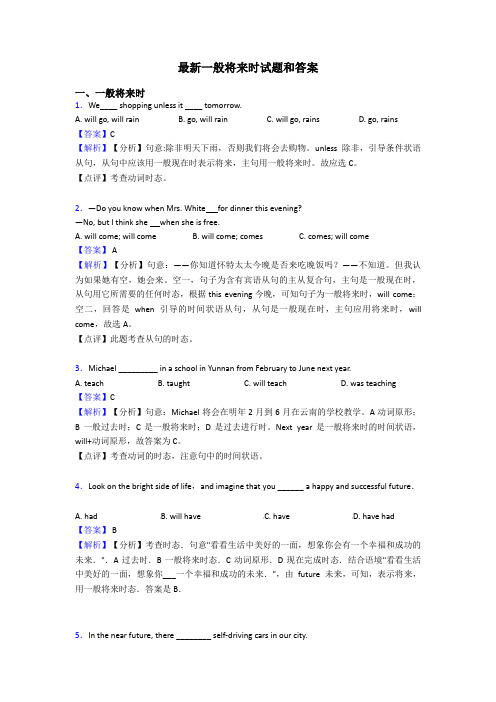
最新一般将来时试题和答案一、一般将来时1.We____ shopping unless it ____ tomorrow.A. will go, will rainB. go, will rainC. will go, rainsD. go, rains【答案】C【解析】【分析】句意:除非明天下雨,否则我们将会去购物。
unless 除非,引导条件状语从句,从句中应该用一般现在时表示将来,主句用一般将来时。
故应选C。
【点评】考查动词时态。
2.—Do you know when Mrs. White for dinner this evening?—No, but I think she when she is free.A. will come; will comeB. will come; comesC. comes; will come【答案】 A【解析】【分析】句意:——你知道怀特太太今晚是否来吃晚饭吗?——不知道。
但我认为如果她有空,她会来。
空一,句子为含有宾语从句的主从复合句,主句是一般现在时,从句用它所需要的任何时态,根据this evening今晚,可知句子为一般将来时,will come;空二,回答是when引导的时间状语从句,从句是一般现在时,主句应用将来时,will come,故选A。
【点评】此题考查从句的时态。
3.Michael _________ in a school in Yunnan from February to June next year.A. teachB. taughtC. will teachD. was teaching【答案】C【解析】【分析】句意:Michael将会在明年2月到6月在云南的学校教学。
A动词原形;B一般过去时;C是一般将来时;D是过去进行时。
Next year是一般将来时的时间状语,will+动词原形,故答案为C。
【点评】考查动词的时态,注意句中的时间状语。
一般将来时练习题(含答案)
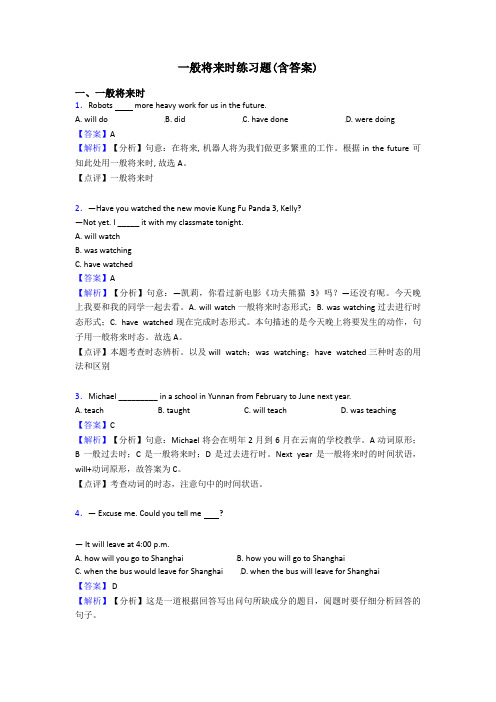
一般将来时练习题(含答案)一、一般将来时1.Robots more heavy work for us in the future.A. will doB. didC. have doneD. were doing【答案】A【解析】【分析】句意:在将来, 机器人将为我们做更多繁重的工作。
根据in the future 可知此处用一般将来时, 故选A。
【点评】一般将来时2.—Have you watched the new movie Kung Fu Panda 3, Kelly?—Not yet. I _____ it with my classmate tonight.A. will watchB. was watchingC. have watched【答案】A【解析】【分析】句意:—凯莉,你看过新电影《功夫熊猫3》吗?—还没有呢。
今天晚上我要和我的同学一起去看。
A. will watch一般将来时态形式;B. was watching过去进行时态形式;C. have watched现在完成时态形式。
本句描述的是今天晚上将要发生的动作,句子用一般将来时态。
故选A。
【点评】本题考查时态辨析。
以及will watch;was watching;have watched三种时态的用法和区别3.Michael _________ in a school in Yunnan from February to June next year.A. teachB. taughtC. will teachD. was teaching【答案】C【解析】【分析】句意:Michael将会在明年2月到6月在云南的学校教学。
A动词原形;B一般过去时;C是一般将来时;D是过去进行时。
Next year是一般将来时的时间状语,will+动词原形,故答案为C。
【点评】考查动词的时态,注意句中的时间状语。
4.— Excuse me. Could you tell me ?— It will leave at 4:00 p.m.A. how will you go to ShanghaiB. how you will go to ShanghaiC. when the bus would leave for ShanghaiD. when the bus will leave for Shanghai【答案】 D【解析】【分析】这是一道根据回答写出问句所缺成分的题目,阅题时要仔细分析回答的句子。
一般将来时练习题及答案
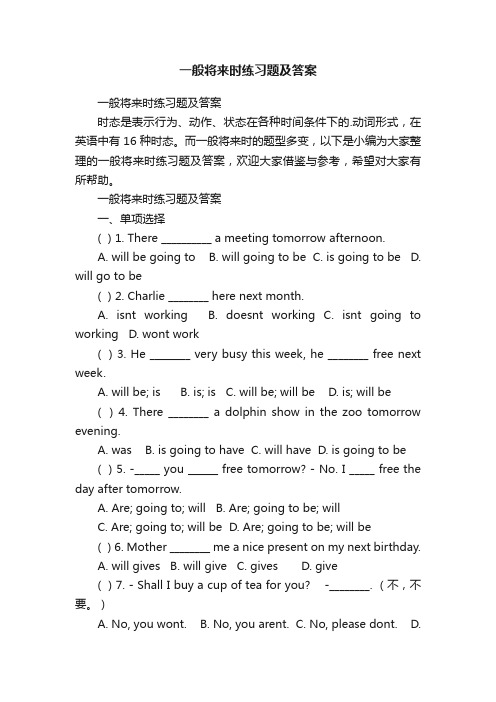
一般将来时练习题及答案一般将来时练习题及答案时态是表示行为、动作、状态在各种时间条件下的.动词形式,在英语中有16种时态。
而一般将来时的题型多变,以下是小编为大家整理的一般将来时练习题及答案,欢迎大家借鉴与参考,希望对大家有所帮助。
一般将来时练习题及答案一、单项选择( ) 1. There __________ a meeting tomorrow afternoon.A. will be going toB. will going to beC. is going to beD. will go to be( ) 2. Charlie ________ here next month.A. isnt workingB. doesnt workingC. isnt going to workingD. wont work( ) 3. He ________ very busy this week, he ________ free next week.A. will be; isB. is; isC. will be; will beD. is; will be( ) 4. There ________ a dolphin show in the zoo tomorrow evening.A. wasB. is going to haveC. will haveD. is going to be( ) 5. -_____ you ______ free tomorrow? - No. I _____ free the day after tomorrow.A. Are; going to; willB. Are; going to be; willC. Are; going to; will beD. Are; going to be; will be( ) 6. Mother ________ me a nice present on my next birthday.A. will givesB. will giveC. givesD. give( ) 7. - Shall I buy a cup of tea for you? -________. (不,不要。
英语一般将来时题20套(带答案)含解析
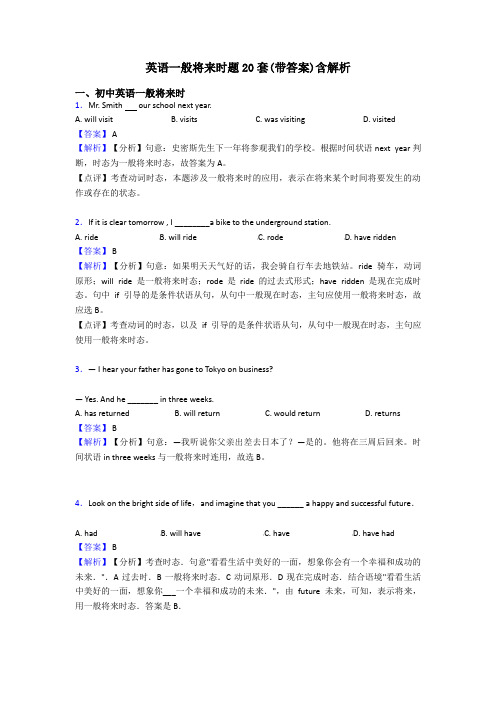
英语一般将来时题20套(带答案)含解析一、初中英语一般将来时1.Mr. Smith our school next year.A. will visitB. visitsC. was visitingD. visited【答案】 A【解析】【分析】句意:史密斯先生下一年将参观我们的学校。
根据时间状语next year判断,时态为一般将来时态,故答案为A。
【点评】考查动词时态,本题涉及一般将来时的应用,表示在将来某个时间将要发生的动作或存在的状态。
2.If it is clear tomorrow , I ________a bike to the underground station.A. rideB. will rideC. rodeD. have ridden【答案】 B【解析】【分析】句意:如果明天天气好的话,我会骑自行车去地铁站。
ride骑车,动词原形;will ride是一般将来时态;rode是ride的过去式形式;have ridden是现在完成时态。
句中if引导的是条件状语从句,从句中一般现在时态,主句应使用一般将来时态,故应选B。
【点评】考查动词的时态,以及if引导的是条件状语从句,从句中一般现在时态,主句应使用一般将来时态。
3.— I hear your father has gone to Tokyo on business?— Yes. And he _______ in three weeks.A. has returnedB. will returnC. would returnD. returns【答案】 B【解析】【分析】句意:—我听说你父亲出差去日本了?—是的。
他将在三周后回来。
时间状语in three weeks与一般将来时连用,故选B。
4.Look on the bright side of life,and imagine that you ______ a happy and successful future.A. hadB. will haveC. haveD. have had【答案】 B【解析】【分析】考查时态.句意"看看生活中美好的一面,想象你会有一个幸福和成功的未来.".A过去时.B一般将来时态.C动词原形.D现在完成时态.结合语境"看看生活中美好的一面,想象你___一个幸福和成功的未来.",由future未来,可知,表示将来,用一般将来时态.答案是B.5.—Excuse me,could you please tell me if the meeting ________ on time?—If it ________ tomorrow,we'll have to put it off.A. will hold; snowsB. will be held; snowsC. will be held; snowD. holds; will snow 【答案】B【解析】【分析】句意:—打扰了,请你告诉我会议是否准时举行好吗?—如果明天下雪,我们只好推迟了。
【英语】 一般将来时测试题及答案

【英语】一般将来时测试题及答案一、一般将来时1.I wonder when they ________ for Beijing. I will go to the train station to see them off when they ________.A. will leave; leaveB. leave; will leaveC. go; leaveD. will go; leave【答案】 A【解析】【分析】句意:我想知道他们什么时候去北京。
当他们离开的时候,我将去车站送他们。
leave for,动身前往,去……。
第一句话是宾语从句,因此从句可以使用一般将来时,第二句是when引导的时间状语从句,应遵循主将从现的原则,因此应使用一般现在时,故答案是A。
【点评】考查动词辨析和时间状语从句中的主将从现原则。
注意识记固定搭配leave for,同时只要记住在时间状语从句中的主将从现原则。
2.I’m so lucky because I see more cartoon characters next month.A. is able toB. will be able toC. be able toD. was able to【答案】B【解析】【分析】句意:我真幸运因为我下个月能看到更多的卡通人物。
next month表将来,因此用will be able to。
故选B。
【点评】考查一般将来时。
3.—Have you watched the new movie Kung Fu Panda 3, Kelly?—Not yet. I _____ it with my classmate tonight.A. will watchB. was watchingC. have watched【答案】A【解析】【分析】句意:—凯莉,你看过新电影《功夫熊猫3》吗?—还没有呢。
今天晚上我要和我的同学一起去看。
英语一般将来时试题(有答案和解析)含解析

英语一般将来时试题(有答案和解析)含解析一、初中英语一般将来时1.I wonder when they ________ for Beijing. I will go to the train station to see them off when they ________.A. will leave; leaveB. leave; will leaveC. go; leaveD. will go; leave【答案】 A【解析】【分析】句意:我想知道他们什么时候去北京。
当他们离开的时候,我将去车站送他们。
leave for,动身前往,去……。
第一句话是宾语从句,因此从句可以使用一般将来时,第二句是when引导的时间状语从句,应遵循主将从现的原则,因此应使用一般现在时,故答案是A。
【点评】考查动词辨析和时间状语从句中的主将从现原则。
注意识记固定搭配leave for,同时只要记住在时间状语从句中的主将从现原则。
2.With the development of science and technology, robot cooks ______ in our families in the future.A. appearB. appearedC. will appearD. were appearing【答案】 C【解析】【分析】句意:随着科学技术的发展,在未来机器人厨师将出现在我们的家庭中. 根据in the future可知,此句表示动作发生在将来,所以用一般将来时态;一般将来时态结构为:will+动词原形,故选C.【点评】判断动词的时态,要通过所给的时间状语、提示词或语境去判断动词存在的状态. 一般将来时态结构为:will+动词原形.3.— I hear your father has gone to Tokyo on business?— Yes. And he _______ in three weeks.A. has returnedB. will returnC. would returnD. returns【答案】 B【解析】【分析】句意:—我听说你父亲出差去日本了?—是的。
【英语】英语一般将来时题20套(带答案)
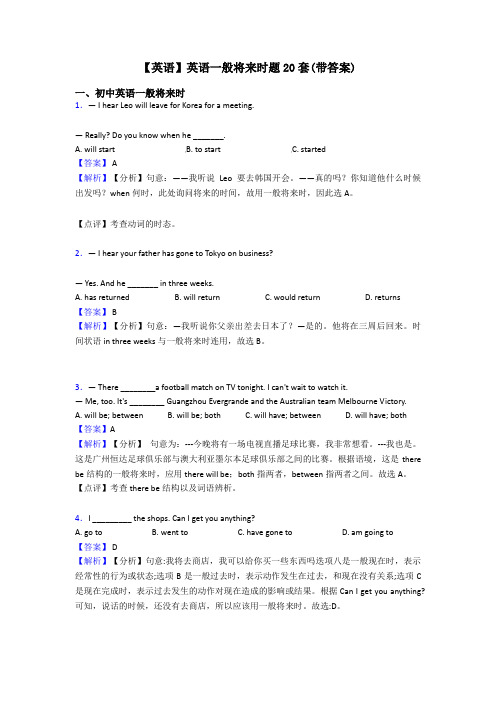
【英语】英语一般将来时题20套(带答案)一、初中英语一般将来时1.— I hear Leo will leave for Korea for a meeting.— Really? Do you know when he _______.A. will startB. to startC. started【答案】 A【解析】【分析】句意:——我听说Leo要去韩国开会。
——真的吗?你知道他什么时候出发吗?when何时,此处询问将来的时间,故用一般将来时,因此选A。
【点评】考查动词的时态。
2.— I hear your father has gone to Tokyo on business?— Yes. And he _______ in three weeks.A. has returnedB. will returnC. would returnD. returns【答案】 B【解析】【分析】句意:—我听说你父亲出差去日本了?—是的。
他将在三周后回来。
时间状语in three weeks与一般将来时连用,故选B。
3.— There ________a football match on TV tonight. I can't wait to watch it.— Me, too. It's ________ Guangzhou Evergrande and the Australian team Melbourne Victory.A. will be; betweenB. will be; bothC. will have; betweenD. will have; both【答案】A【解析】【分析】句意为:---今晚将有一场电视直播足球比赛,我非常想看。
---我也是。
这是广州恒达足球俱乐部与澳大利亚墨尔本足球俱乐部之间的比赛。
根据语境,这是there be结构的一般将来时,应用there will be;both指两者,between指两者之间。
【英语】英语一般将来时题20套(带答案)含解析
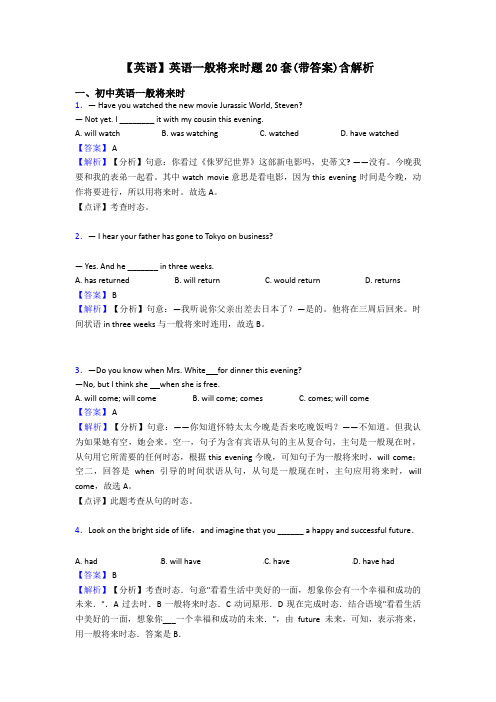
【英语】英语一般将来时题20套(带答案)含解析一、初中英语一般将来时1.— Have you watched the new movie Jurassic World, Steven?— Not yet. I ________ it with my cousin this evening.A. will watchB. was watchingC. watchedD. have watched【答案】 A【解析】【分析】句意:你看过《侏罗纪世界》这部新电影吗,史蒂文? ——没有。
今晚我要和我的表弟一起看。
其中watch movie意思是看电影,因为this evening 时间是今晚,动作将要进行,所以用将来时。
故选A。
【点评】考查时态。
2.— I hear your father has gone to Tokyo on business?— Yes. And he _______ in three weeks.A. has returnedB. will returnC. would returnD. returns【答案】 B【解析】【分析】句意:—我听说你父亲出差去日本了?—是的。
他将在三周后回来。
时间状语in three weeks与一般将来时连用,故选B。
3.—Do you know when Mrs. White for dinner this evening?—No, but I think she when she is free.A. will come; will comeB. will come; comesC. comes; will come【答案】 A【解析】【分析】句意:——你知道怀特太太今晚是否来吃晚饭吗?——不知道。
但我认为如果她有空,她会来。
空一,句子为含有宾语从句的主从复合句,主句是一般现在时,从句用它所需要的任何时态,根据this evening今晚,可知句子为一般将来时,will come;空二,回答是when引导的时间状语从句,从句是一般现在时,主句应用将来时,will come,故选A。
【英语】 一般将来时练习题(含答案)
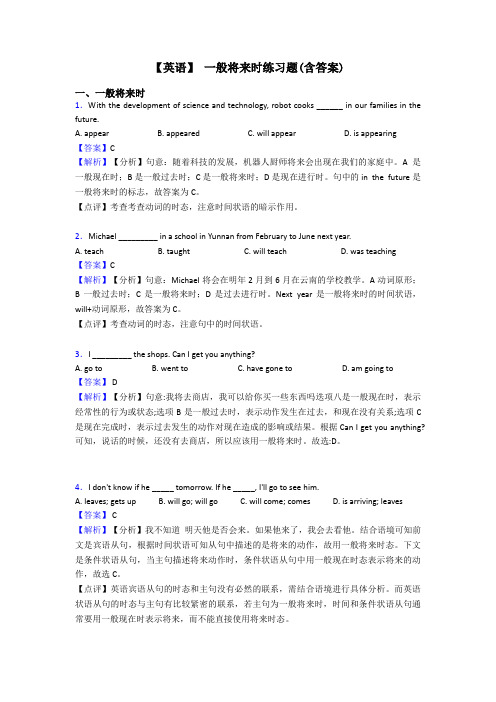
【英语】一般将来时练习题(含答案)一、一般将来时1.With the development of science and technology, robot cooks ______ in our families in the future.A. appearB. appearedC. will appearD. is appearing【答案】C【解析】【分析】句意:随着科技的发展,机器人厨师将来会出现在我们的家庭中。
A是一般现在时;B是一般过去时;C是一般将来时;D是现在进行时。
句中的in the future是一般将来时的标志,故答案为C。
【点评】考查考查动词的时态,注意时间状语的暗示作用。
2.Michael _________ in a school in Yunnan from February to June next year.A. teachB. taughtC. will teachD. was teaching【答案】C【解析】【分析】句意:Michael将会在明年2月到6月在云南的学校教学。
A动词原形;B一般过去时;C是一般将来时;D是过去进行时。
Next year是一般将来时的时间状语,will+动词原形,故答案为C。
【点评】考查动词的时态,注意句中的时间状语。
3.I _________ the shops. Can I get you anything?A. go toB. went toC. have gone toD. am going to【答案】 D【解析】【分析】句意:我将去商店,我可以给你买一些东西吗迭项八是一般现在时,表示经常性的行为或状态;选项B是一般过去时,表示动作发生在过去,和现在没有关系;选项C 是现在完成时,表示过去发生的动作对现在造成的影响或结果。
根据Can I get you anything?可知,说话的时候,还没有去商店,所以应该用一般将来时。
【英语】一般将来时试题和答案经典

【英语】一般将来时试题和答案经典一、一般将来时1.- My aunt me to Europe for vacation next month.- Have a good time!A. takeB. tookC. will take【答案】 C【解析】【分析】句意:——我阿姨带我下个月去欧洲度假。
——玩得高兴!根据next month可知, 叙述的是在将来发生的事情, 故用一般将来时态, 故选C。
【点评】一般将来时2.I’m so lucky because I see more cartoon characters next month.A. is able toB. will be able toC. be able toD. was able to【答案】B【解析】【分析】句意:我真幸运因为我下个月能看到更多的卡通人物。
next month表将来,因此用will be able to。
故选B。
【点评】考查一般将来时。
3.Mr. Green, a famous writer, ______our school next week.A. visitedB. visitsC. was visitingD. will visit【答案】 D【解析】【分析】句意:格林先生,一位著名的作家,下周要来我们学校参观。
A是一般过去时;B是一般现在时;C是过去进行时;D是一般将来时。
根据next week可知此处用一般将来时,故答案为D。
【点评】考查动词的时态,注意找语境中的时间状语。
4.—Have you watched the new movie Kung Fu Panda 3, Kelly?—Not yet. I________it with my classmate tonight.A. will watchB. was watchingC. have watched【答案】 A【解析】【分析】句意:---你看了新电影《功夫熊猫3》了吗,凯利?---还没有,我今天晚上和同学去看。
【英语】英语一般将来时题20套(带答案)
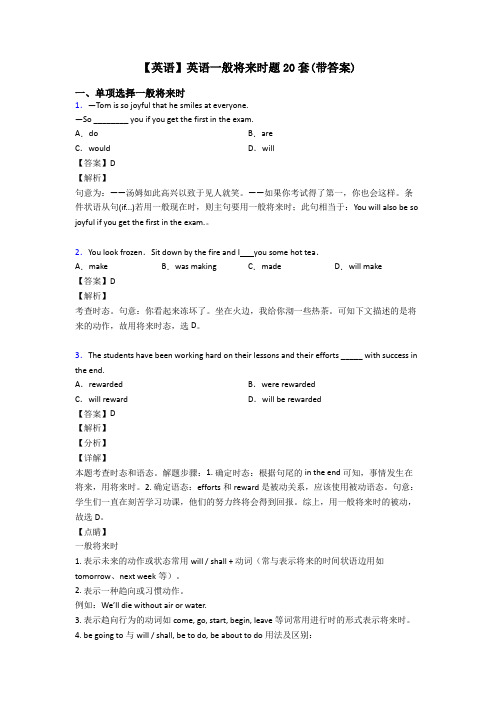
【答案】B
【解析】
考查时态。句意“将要被建的北京至上海的铁路,时速达350Km/时,将把两地的旅途用时从12小时缩短到5小时。”根据to be built可知,铁路是将要建设,故用将来时。故选B。
11.—Mike was rushed to hospital last night.Is he all right?
4. be going to与will / shall, be to do, be about to do用法及区别:
(1)shall / will do表示未事先考虑过,即说话时临时作出的决定。
(2)be going to表示现在打算在最近或将来要做某事,这种打算往往经过事先考虑,甚至已做了某种准备;be going to表将来,不能用在条件状语从句的主句中;而will do则能,表意愿。
A.will comeB.comesC.has comeD.would come
【答案】A
【解析】
试题分析:考查动词时态。句意:给他提姆买个手机怎么样?毕竟他不再是个孩子了。我认为是必要的,因为我们有时会想确认他是否会回来吃饭。根据句意这是一个宾语从句,确认他是否将回来吃饭,是一般将来时,A. will come一般将来时B. comes一般现在时C. has come现在完成时D. would come过去将来时,所以A正确。
【答案】C
【解析】
C考查时态。答语意为“别担心,我帮你去取。等一下。”此处will用于一般将来时,表示“将要做临时决定的事情”。
14.Only after one has become a parent _____ how great his parents are.
(英语)英语一般将来时题20套(带答案)含解析
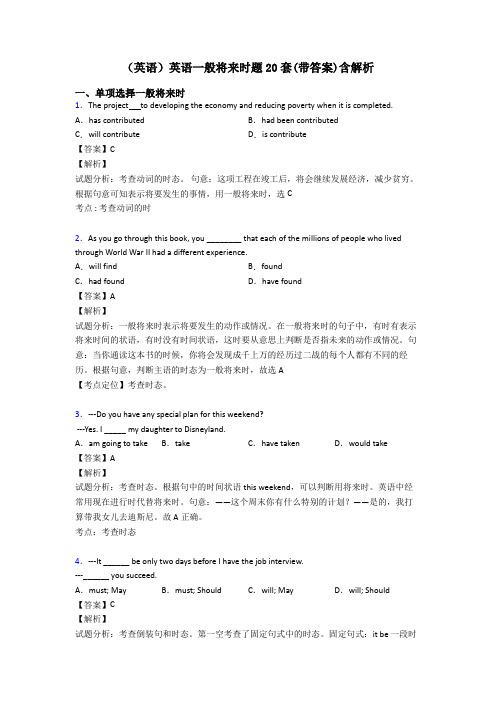
(英语)英语一般将来时题20套(带答案)含解析一、单项选择一般将来时1.The project to developing the economy and reducing poverty when it is completed. A.has contributed B.had been contributedC.will contribute D.is contribute【答案】C【解析】试题分析:考查动词的时态。
句意:这项工程在竣工后,将会继续发展经济,减少贫穷。
根据句意可知表示将要发生的事情,用一般将来时,选C考点 : 考查动词的时2.As you go through this book, you ________ that each of the millions of people who lived through World War II had a different experience.A.will find B.foundC.had found D.have found【答案】A【解析】试题分析:一般将来时表示将要发生的动作或情况。
在一般将来时的句子中,有时有表示将来时间的状语,有时没有时间状语,这时要从意思上判断是否指未来的动作或情况。
句意:当你通读这本书的时候,你将会发现成千上万的经历过二战的每个人都有不同的经历。
根据句意,判断主语的时态为一般将来时,故选A【考点定位】考查时态。
3.---Do you have any special plan for this weekend?---Yes. I _____ my daughter to Disneyland.A.am going to take B.take C.have taken D.would take【答案】A【解析】试题分析:考查时态。
根据句中的时间状语this weekend,可以判断用将来时。
英语中经常用现在进行时代替将来时。
一般将来时试题及答案
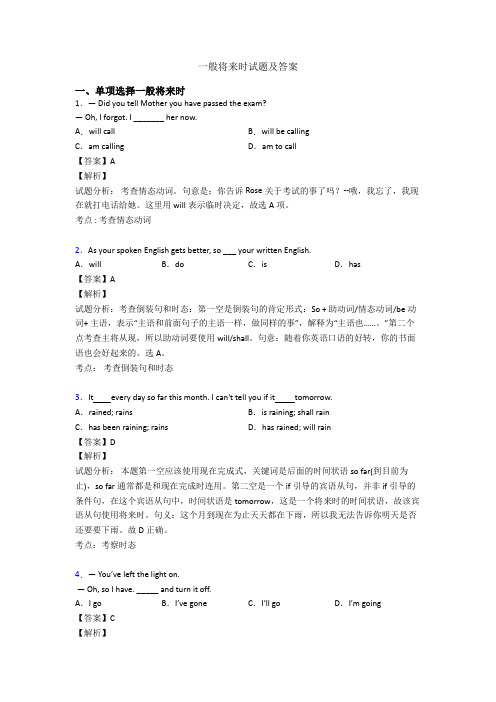
—So ________ you if you get the first in the exam.
A.doB.are
C.wouldD.will
【答案】D
【解析】
句意为:——汤姆如此高兴以致于见人就笑。——如果你考试得了第一,你也会这样。条件状语从句(if...)若用一般现在时,则主句要用一般将来时;此句相当于:You will also be so joyful if you get the first in the exam.。
9.“What do you want to be?” asked Mrs. Crawford. “Oh, I ________ president,” said the boy, with a smile.
A.have beenB.am
C.wasD.will be
【答案】D
【解析】
试题分析:考查动词的时态。句意:Crawford夫人问道:“你(长大了)想干什么?”“哦,我想当总统。”男孩面带微笑地说。根据问句“What do you want to be?”可知,该句中暗含“when you grow up”,因此回答用一般将来时。
---- Really? I ______ her a present after work this afternoon.
A.will buyB.am going to buy
C.am buyingD.am to buy
【答案】A
【解析】
试题分析:考查时态。句意:杰姆斯,你知道明天是凯特的生日吗?真的吗?我今天下午下班后会给他买一个礼物。买礼物的动作将来某一时刻做的事情,用一般将来时。故选A。
(英语)英语一般将来时练习题20篇含解析
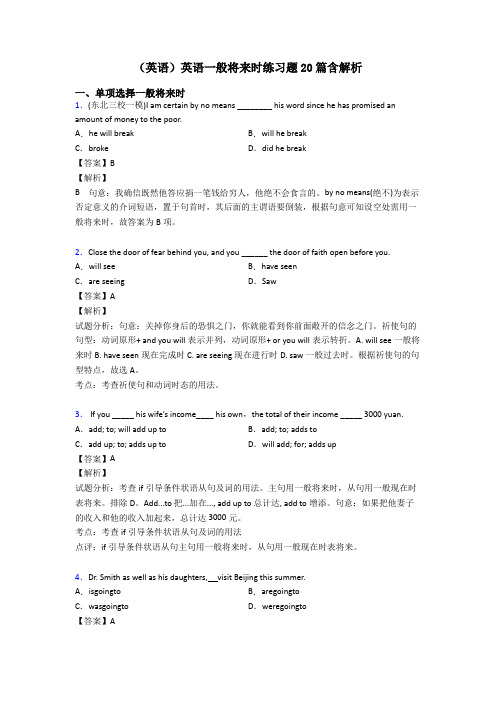
(英语)英语一般将来时练习题20篇含解析一、单项选择一般将来时1.(东北三校一模)I am certain by no means ________ his word since he has promised an amount of money to the poor.A.he will break B.will he breakC.broke D.did he break【答案】B【解析】B句意:我确信既然他答应捐一笔钱给穷人,他绝不会食言的。
by no means(绝不)为表示否定意义的介词短语,置于句首时,其后面的主谓语要倒装,根据句意可知设空处需用一般将来时,故答案为B项。
2.Close the door of fear behind you, and you ______ the door of faith open before you. A.will see B.have seenC.are seeing D.Saw【答案】A【解析】试题分析:句意:关掉你身后的恐惧之门,你就能看到你前面敞开的信念之门。
祈使句的句型:动词原形+ and you will表示并列,动词原形+ or you will表示转折。
A. will see 一般将来时 B. have seen现在完成时 C. are seeing 现在进行时D. saw一般过去时。
根据祈使句的句型特点,故选A。
考点:考查祈使句和动词时态的用法。
3.If you _____ his wife’s income____ his own,the total of their income _____ 3000 yuan. A.add; to; will add up to B.add; to; adds toC.add up; to; adds up to D.will add; for; adds up【答案】A【解析】试题分析:考查if引导条件状语从句及词的用法。
英语一般将来时题20套(带答案)

英语一般将来时题20套(带答案)一、单项选择一般将来时1.(东北三校一模)I am certain by no means ________ his word since he has promised an amount of money to the poor.A.he will break B.will he breakC.broke D.did he break【答案】B【解析】B句意:我确信既然他答应捐一笔钱给穷人,他绝不会食言的。
by no means(绝不)为表示否定意义的介词短语,置于句首时,其后面的主谓语要倒装,根据句意可知设空处需用一般将来时,故答案为B项。
2.The students have been working hard on their lessons and their efforts _____ with success in the end.A.rewarded B.were rewardedC.will reward D.will be rewarded【答案】D【解析】【分析】【详解】本题考查时态和语态。
解题步骤:1. 确定时态:根据句尾的in the end可知,事情发生在将来,用将来时。
2. 确定语态:efforts和reward是被动关系,应该使用被动语态。
句意:学生们一直在刻苦学习功课,他们的努力终将会得到回报。
综上,用一般将来时的被动,故选D。
【点睛】一般将来时1. 表示未来的动作或状态常用will / shall + 动词(常与表示将来的时间状语边用如tomorrow、next week等)。
2. 表示一种趋向或习惯动作。
例如:We’ll die without air or water.3. 表示趋向行为的动词如come, go, start, begin, leave等词常用进行时的形式表示将来时。
4. be going to与will / shall, be to do, be about to do用法及区别:(1)shall / will do表示未事先考虑过,即说话时临时作出的决定。
一般将来时小学语法题及答案
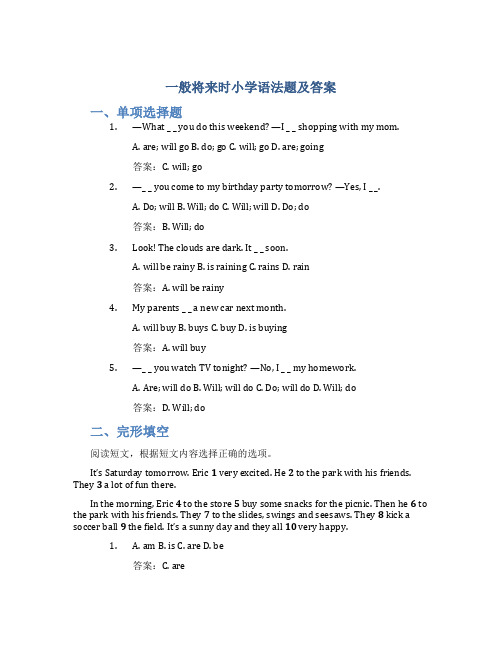
一般将来时小学语法题及答案一、单项选择题1.—What _ _ you do this weekend? —I _ _ shopping with my mom.A. are; will goB. do; goC. will; goD. are; going答案:C. will; go2.—_ _ you come to my birthday party tomorrow? —Yes, I _ _.A. Do; willB. Will; doC. Will; willD. Do; do答案:B. Will; do3.Look! The clouds are dark. It _ _ soon.A. will be rainyB. is rainingC. rainsD. rain答案:A. will be rainy4.My parents _ _ a new car next month.A. will buyB. buysC. buyD. is buying答案:A. will buy5.—_ _ you watch TV tonight? —No, I _ _ my homework.A. Are; will doB. Will; will doC. Do; will doD. Will; do答案:D. Will; do二、完形填空阅读短文,根据短文内容选择正确的选项。
It’s Saturday tomorrow. Eric 1 very excited. He 2 to the park with his friends. They 3 a lot of fun there.In the morning, Eric 4 to the store 5 buy some snacks for the picnic. Then he 6 to the park with his friends. They 7 to the slides, swings and seesaws. They 8 kick a soccer ball 9the field. It’s a sunny day and they all 10 very happy.1. A. am B. is C. are D. be答案:C. are2. A. goes B. go C. went D. going答案:B. go3. A. has B. had C. have D. having答案:C. have4. A. want B. wants C. wanted D. wanting答案:B. wants5. A. but B. and C. or D. so答案:B. and6. A. go B. goes C. going D. to go答案:A. go7. A. play B. plays C. played D. playing答案:A. play8. A. can B. could C. did D. do答案:D. do9. A. on B. at C. to D. in答案:C. to10. A. is B. am C. are D. be答案:C. are三、阅读理解阅读短文,根据短文内容选择正确的选项。
英语一般将来时专项训练100(附答案)
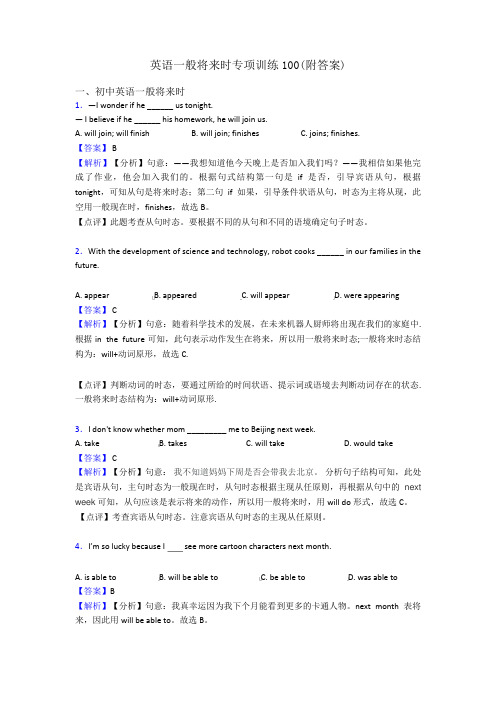
B. won't get; don't study
C. don't get; don't study
D. don't get; won't study
【答案】 B
【解析】【分析】句意:如果你不努力学习,你就不会取得好成绩。主句用一般将时,从
句用一般现在时代替。故选 B。
【点评】此题考查主从句的时态问题,平时应多归纳总结各种时态,语态和句式的结构及 用法。
C. will be ; will be
D. is ; will be
【答案】 D
【解析】【分析】句意:父亲这一周很忙。下一周他将是空闲的。this week,指现在的状
态,用一般现在时:主语+动词原形,如果主语是第三人称单数,谓语动词也变成第三人称
单数,next week.指将来的状态,用将来时态:主语+will do。故选 D。
英语一般将来时专项训练 100(附答案)
一、初中英语一般将来时
1.—I wonder if he ______ us tonight.
— I believe if he ______ his homework, he will join us.
A. will join; will finish
B. will join; finishes
【点评】考查动词的时态。
26.—How long you Liutle Women?
—I am due to return it in two weeks.
A. have;borrowed
B. will;lend
C. will;keep
【答案】 C
【解析】【分析】句意: ——你要借这本《小女人》多久?——我将在两周内归还。根据
- 1、下载文档前请自行甄别文档内容的完整性,平台不提供额外的编辑、内容补充、找答案等附加服务。
- 2、"仅部分预览"的文档,不可在线预览部分如存在完整性等问题,可反馈申请退款(可完整预览的文档不适用该条件!)。
- 3、如文档侵犯您的权益,请联系客服反馈,我们会尽快为您处理(人工客服工作时间:9:00-18:30)。
一般将来时试题和答案一、一般将来时1.If you go to bed earlier, you tired in the morning.A. will feelB. don't feelC. won't feelD. didn't feel【答案】 C【解析】【分析】句意:如果你上床睡觉早些,在早上你就不会感觉到累了。
此题考查if 引导的条件状语从句,主句一般将来时,从句用一般现在时。
根据句意,故选C。
【点评】考查动词时态。
掌握主将从现的句子结构。
2.If it is clear tomorrow , I ________a bike to the underground station.A. rideB. will rideC. rodeD. have ridden【答案】 B【解析】【分析】句意:如果明天天气好的话,我会骑自行车去地铁站。
ride骑车,动词原形;will ride是一般将来时态;rode是ride的过去式形式;have ridden是现在完成时态。
句中if引导的是条件状语从句,从句中一般现在时态,主句应使用一般将来时态,故应选B。
【点评】考查动词的时态,以及if引导的是条件状语从句,从句中一般现在时态,主句应使用一般将来时态。
3.— I hear your father has gone to Tokyo on business?— Yes. And he _______ in three weeks.A. has returnedB. will returnC. would returnD. returns【答案】 B【解析】【分析】句意:—我听说你父亲出差去日本了?—是的。
他将在三周后回来。
时间状语in three weeks与一般将来时连用,故选B。
4.I don't know whether mom _________ me to Beijing next week.A. takeB. takesC. will takeD. would take【答案】 C【解析】【分析】句意:我不知道妈妈下周是否会带我去北京。
分析句子结构可知,此处是宾语从句,主句时态为一般现在时,从句时态根据主现从任原则,再根据从句中的next week可知,从句应该是表示将来的动作,所以用一般将来时,用will do形式,故选C。
【点评】考查宾语从句时态。
注意宾语从句时态的主现从任原则。
5.— There ________a football match on TV tonight. I can't wait to watch it.— Me, too. It's ________ Guangzhou Evergrande and the Australian team Melbourne Victory.A. will be; betweenB. will be; bothC. will have; betweenD. will have; both【答案】A【解析】【分析】句意为:---今晚将有一场电视直播足球比赛,我非常想看。
---我也是。
这是广州恒达足球俱乐部与澳大利亚墨尔本足球俱乐部之间的比赛。
根据语境,这是there be结构的一般将来时,应用there will be;both指两者,between指两者之间。
故选A。
【点评】考查there be结构以及词语辨析。
6.I _________ the shops. Can I get you anything?A. go toB. went toC. have gone toD. am going to【答案】 D【解析】【分析】句意:我将去商店,我可以给你买一些东西吗迭项八是一般现在时,表示经常性的行为或状态;选项B是一般过去时,表示动作发生在过去,和现在没有关系;选项C 是现在完成时,表示过去发生的动作对现在造成的影响或结果。
根据Can I get you anything?可知,说话的时候,还没有去商店,所以应该用一般将来时。
故选:D。
7.If you want to visit the Palace Museum, I ________ tickets for you tomorrow.A. will bookB. bookedC. have bookedD. was booking【答案】 A【解析】【分析】句意:如果你想参观故宫博物馆,我明天给你订票。
book,订购,A.一般将来时;B.一般过去时;C.现在完成时;D.过去进行时。
根据tomorrow,可知动词用一般将来时,故选A。
【点评】考查动词的时态,注意一般将来时的用法。
8.—Do you have any plans for tonight?—Yes ,I____at the new Italian restaurant in town.A. eatB. have eatenC. ateD. am going to eat【答案】 D【解析】【分析】句意:一今天晚上你有什么计划吗?一是的,我打算到镇上新开的意大利餐馆去吃饭。
A.一般现在时;B.现在完成时态;C. 一般过去时;D.一般将来时。
根据询问可知是计划,所以用将来时态,故选D。
9.—Have you watched the new movie Kung Fu Panda 3, Kelly?—Not yet. I________it with my classmate tonight.A. will watchB. was watchingC. have watched【答案】 A【解析】【分析】句意:---你看了新电影《功夫熊猫3》了吗,凯利?---还没有,我今天晚上和同学去看。
A是一般将来时;B是过去进行时;C是现在完成时。
由not yet可知此处动作尚未发生,可排除BC;另外tonight是将来时间,所以用一般将来时。
故答案为A。
【点评】考查动词的时态,注意上下文的暗示词。
10.There ______ a funny cartoon on CCTV 6 this evening.A. willB. will haveC. is going to beD. is going to have【答案】 C【解析】【分析】句意:今天晚上CCTV6有一部有趣的动画片。
今天晚上,将会有,用there will be 或者there is going to be因为a funny cartoon是单数。
故选C。
【点评】考查时态的用法。
11.— Your father has gone to Shenzhen on business, hasn't he?—Yes. And he ________ in two weeks.A. will returnB. has returnedC. returnedD. returns【答案】 A【解析】【分析】句意:——你的父亲已经去深圳出差,不是吗?——是的,他打算两周后回来。
根据时间状语 in two weeks ,可知时态是一般将来时,will+动词原形,故选A。
【点评】此题考查一般将来时。
根据时间状语确定句子时态。
12.—What is your plan for next weekend, Lingling?—I volunteer work in the museum.A. was doingB. didC. have doneD. am going to do【答案】 D【解析】【分析】句意:——玲玲,你下周末打算干什么?——我要去博物馆做义工。
根据题干中的next weekend,可知此句要用一般将来时,故选D。
【点评】考查一般将来时的基本构成及用法。
13.I wonder when they ________ for Beijing. I will go to the train station to see them off when they ________.A. will leave; leaveB. leave; will leaveC. go; leaveD. will go; leave【答案】 A【解析】【分析】句意:我想知道他们什么时候去北京。
当他们离开的时候,我将去车站送他们。
leave for,动身前往,去……。
第一句话是宾语从句,因此从句可以使用一般将来时,第二句是when引导的时间状语从句,应遵循主将从现的原则,因此应使用一般现在时,故答案是A。
【点评】考查动词辨析和时间状语从句中的主将从现原则。
注意识记固定搭配leave for,同时只要记住在时间状语从句中的主将从现原则。
14.-- Tommy, do you know if they _____ to the zoo this Sunday if it _____?-- Sorry, I have no idea.A. will go; is fineB. go; is fineC. will go; is going to be fineD. go; will be fine【答案】 A【解析】【分析】句意:——Tommy,你知道这个星期天如果晴天他们是否去动物园吗?——对不起,我不知道。
第一个空前的if引导宾语从句,意思是“是否”,根据从句的tomorrow可知用一般将来时;第二个空前的if引导条件状语从句,意思是“如果”,从句中用一般现在时表示将来,故选A。
【点评】考查动词的时态。
15.—Could you tell me_______?—In five minutes, at 10: 25.A. when did the next underground arriveB. when the next underground arrivedC. when will the next underground arriveD. when the next underground will arrive【答案】D【解析】【分析】句意:—你能告诉我下一个地铁什么时候到吗?—五分钟后,10点25分。
tell后跟宾语从句,宾语从句需用陈述句语序,A、C两项都是疑问句语序,可排除。
根据答语In five minutes,结合句意语境,可知还没有到站,需用一般将来时态,故答案选D。
【点评】考查宾语从句。
根据语境确定宾语从句的时态,注意陈述语序。
16.I'm glad to hear you to a new house next week.A. moveB. movedC. have movedD. will move【答案】 D【解析】【分析】听到你下周将搬新家,我很高兴。
